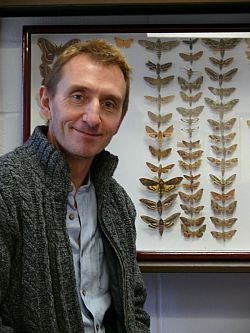Professor’s research to address plight of the bumblebee
The plight of the bumblebee is the guiding passion behind research projects at Sussex led by newly appointed biologist and conservationist Professor Dave Goulson.
 Professor Dave Goulson
Professor Dave Goulson
Professor Goulson, author of A Sting in the Tale (to be serialised next week as ‘Book of the Week’ on BBC Radio 4), turned a childhood obsession with wildlife into an academic career that has now brought him to Sussex.
One of the UK’s most respected conservationists and the founder of the Bumblebee Conservation Trust, Professor Goulson joins the School of Life Sciences.
In three new major projects funded by the Biotechnology and Biological Science Research Council (BBSRC) and the government Department for Environment, Food & Rural Affairs (Defra), Professor Goulson's group will be investigating:
- factors affecting how many wild bumblebee nests can survive on farms and making farms more bee- and wildlife-friendly; and
- the impacts that neonicotinoid pesticides have on bees, looking at how pesticides interfere with foraging behaviour and overall bee colony performance.
As he outlines in his book, Professor Goulson’s passion to reinstate one of the nationally extinct species – the short-haired bumblebee, once commonly found in the marshes of Kent and now found only in New Zealand – embraces both fundamental research and public engagement, to ensure that the bumblebee is better understood and that it remains a part of the British wildlife landscape.
On his move to Sussex from Stirling, Professor Goulson says: “The South is a lot warmer and therefore offers the opportunity to investigate lots more fascinating insects. And I look forward to seeing Sussex become the best place for bee research in the world.”
Being in Brighton also means that Professor Goulson is just a short hop away from his farm and fields in France, where he is cultivating a big experiment on how to recreate a flower-rich meadow.
“I’m sowing lots of different ‘hemiparasitic’ flowers there, which should help to suppress the grasses and encourage other flowers to grow,” says Professor Goulson.
Professor Goulson is also involved, in association with the Bumblebee Conservation Trust, in a Beewalks scheme that encourages the public to help to monitor changing bumblebee populations over time: “We hope to get the public counting pollinators in their allotments and gardens, to see if there are enough bees to pollinate all our veggie crops.”

